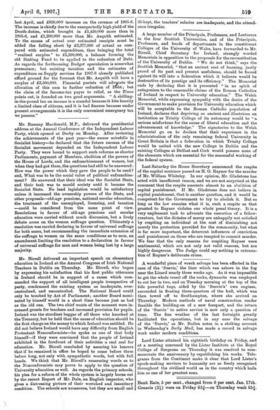Last Saturday the Home Secretary announced the respite of the
capital sentence passed on H. G. Rayner for the murder of Mr. William Whiteley. In our opinion, Mr. Gladstone has acted with insufficient reason, and we are not surprised at the comment that the respite amounts almost to an abolition of capital punishment. If Mr. Gladstone does not believe in capital punishment, that is another question, and it would be competent for the Government to try to abolish it. But so long as the law remains what it is, such a respite as that granted to Rayner violates our whole penal theory. It is a very unpleasant task to advocate the execution of a fellow- creature, but the dictates of mercy are unhappily not satisfied by respiting an individual at the cost of diminishing not merely the protection provided for the community, but what is far more important, the deterrent influences of conviction and punishment on those who are tempted to commit murder. We fear that the only reasons for respiting Rayner were sentimental, which are not only not valid reasons, but are highly dangerous. The Judge could say nothing in extenua- tion of Rayner's deliberate crime.










































 Previous page
Previous page